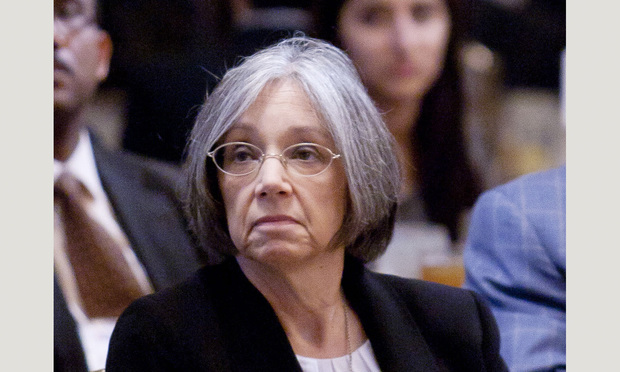7th Circ.: Applying 'Bristol-Myers' to Class Actions Would Be a 'Major Change in the Law'
"This change is not warranted by the Supreme Court's decision in Bristol-Myers," wrote the U.S. Court of Appeals for the Seventh Circuit, reversing dismissal of a class action based on Bristol-Myers Squibb v. Superior Court of California. Wednesday's ruling comes one day after the D.C. Circuit dodged the same question in a similar case.
March 11, 2020 at 04:08 PM
4 minute read
 Judge Diane Wood of the U.S. Court of Appeals for the Seventh Circuit.
Judge Diane Wood of the U.S. Court of Appeals for the Seventh Circuit.
A federal appeals court refused to adopt what it called a "major change in the law," reversing dismissal of a class action based on the U.S. Supreme Court's seminal jurisdictional ruling in Bristol-Myers Squibb v. Superior Court of California.
The U.S. Court of Appeals for the Seventh Circuit struck down the defense argument that the jurisdictional limits imposed by the Supreme Court's 2017 decision, in a case that involved a mass action, apply to a nationwide class action. Wednesday's decision, the first of its kind by an appeals court, comes one day after the U.S. Court of Appeals for the D.C. Circuit punted on the same issue in a similar case.
In a unanimous ruling in Mussat v. IQVIA, the panel found "the principles announced in Bristol-Myers do not apply to the case of a nationwide class action filed in federal court under a federal statute."
"Despite its insistence to the contrary, IQVIA urges a major change in the law of personal jurisdiction and class actions," wrote Chief Judge Diane Wood. "This change is not warranted by the Supreme Court's decision in Bristol-Myers, nor by the alternative arguments based on Rule 4(k) that IQVIA puts forth."
IQVIA attorney Joseph Palmore, co-chair of Morrison & Foerster's appellate and Supreme Court practice group, in Washington, D.C., did not respond to a request for comment, nor did plaintiffs attorney Dan Edelman, of Edelman Combs Latturner & Goodwin in Chicago.
Bristol-Myers held that most of the 600 plaintiffs in a mass action over the blood thinner Plavix had failed to establish specific jurisdiction, because there wasn't enough of a link between their claims and California, where they brought their lawsuit. In a footnote to her dissent, Justice Sonia Sotomayor noted that the majority's opinion failed to address its impact on nationwide class actions. On that question, judges have divided.
In the case before the Seventh Circuit, an Illinois doctor sued IQVIA, a health care information company in Pennsylvania, for allegedly sending two unsolicited faxes to his office in violation of the U.S. Telephone Consumer Protection Act.
On Oct. 26, U.S. District Judge Virginia Kendall of the Northern District of Illinois granted IQVIA's motion to strike the national class, whose members had no relationship to Illinois. Both the Washington Legal Foundation and the U.S. Chamber Litigation Center filed amicus briefs supporting IQVIA, and the American Association for Justice supported the plaintiff, Florence Mussat, in an amicus brief.
At oral arguments last September, Wood and Judge Amy Barrett remarked several times that IQVIA appeared to be overturning more than 50 years of class action precedent.
Tuesday's opinion noted that, unlike Bristol-Myers, the IQVIA case was in federal court, not state court, and has unnamed class members who are not "full parties" under the Federal Rule 23 of Civil Procedure.
"Class actions, in short, are different from many other types of aggregate litigation, and that difference matters in numerous ways for the unnamed members of the class," Wood wrote. "Bristol-Myers neither reached nor resolved the question whether, in a Rule 23 class action, each unnamed member of the class must separately establish specific personal jurisdiction over a defendant. In holding otherwise, the district court failed to recognize the critical distinction between this case and Bristol-Myers."
The panel also rejected IQVIA's alternative argument that the nationwide class action would be inconsistent with Federal Rule of Civil Procedure 4(k), which governs service of process, concluding that the defendant was "mixing up the concepts of service and jurisdiction."
IQVIA also raised a procedural issue: that the Seventh Circuit lacked jurisdiction to hear the appeal because Kendall's order did not grant or deny class certification, as required under Federal Rule 23 of Civil Procedure.
"The cases are clear: Rule 23(f) grants the courts of appeals jurisdiction to hear interlocutory appeals of orders that expressly or as a functional matter resolve the question of class certification one way or the other," Wood wrote, citing the Supreme Court's 2017 decision in Microsoft v. Baker. "The fact that Mussat still has an opportunity to seek certification of a much narrower class does not change anything."
This content has been archived. It is available through our partners, LexisNexis® and Bloomberg Law.
To view this content, please continue to their sites.
Not a Lexis Subscriber?
Subscribe Now
Not a Bloomberg Law Subscriber?
Subscribe Now
NOT FOR REPRINT
© 2025 ALM Global, LLC, All Rights Reserved. Request academic re-use from www.copyright.com. All other uses, submit a request to [email protected]. For more information visit Asset & Logo Licensing.
You Might Like
View All
Hogan Lovells, Jenner & Block Challenge Trump EOs Impacting Gender-Affirming Care
3 minute read
DC Lawsuits Seek to Prevent Mass Firings and Public Naming of FBI Agents
3 minute read
Divided State Supreme Court Clears the Way for Child Sexual Abuse Cases Against Church, Schools

'Serious Legal Errors'?: Rival League May Appeal Following Dismissal of Soccer Antitrust Case
6 minute readTrending Stories
Who Got The Work
J. Brugh Lower of Gibbons has entered an appearance for industrial equipment supplier Devco Corporation in a pending trademark infringement lawsuit. The suit, accusing the defendant of selling knock-off Graco products, was filed Dec. 18 in New Jersey District Court by Rivkin Radler on behalf of Graco Inc. and Graco Minnesota. The case, assigned to U.S. District Judge Zahid N. Quraishi, is 3:24-cv-11294, Graco Inc. et al v. Devco Corporation.
Who Got The Work
Rebecca Maller-Stein and Kent A. Yalowitz of Arnold & Porter Kaye Scholer have entered their appearances for Hanaco Venture Capital and its executives, Lior Prosor and David Frankel, in a pending securities lawsuit. The action, filed on Dec. 24 in New York Southern District Court by Zell, Aron & Co. on behalf of Goldeneye Advisors, accuses the defendants of negligently and fraudulently managing the plaintiff's $1 million investment. The case, assigned to U.S. District Judge Vernon S. Broderick, is 1:24-cv-09918, Goldeneye Advisors, LLC v. Hanaco Venture Capital, Ltd. et al.
Who Got The Work
Attorneys from A&O Shearman has stepped in as defense counsel for Toronto-Dominion Bank and other defendants in a pending securities class action. The suit, filed Dec. 11 in New York Southern District Court by Bleichmar Fonti & Auld, accuses the defendants of concealing the bank's 'pervasive' deficiencies in regards to its compliance with the Bank Secrecy Act and the quality of its anti-money laundering controls. The case, assigned to U.S. District Judge Arun Subramanian, is 1:24-cv-09445, Gonzalez v. The Toronto-Dominion Bank et al.
Who Got The Work
Crown Castle International, a Pennsylvania company providing shared communications infrastructure, has turned to Luke D. Wolf of Gordon Rees Scully Mansukhani to fend off a pending breach-of-contract lawsuit. The court action, filed Nov. 25 in Michigan Eastern District Court by Hooper Hathaway PC on behalf of The Town Residences LLC, accuses Crown Castle of failing to transfer approximately $30,000 in utility payments from T-Mobile in breach of a roof-top lease and assignment agreement. The case, assigned to U.S. District Judge Susan K. Declercq, is 2:24-cv-13131, The Town Residences LLC v. T-Mobile US, Inc. et al.
Who Got The Work
Wilfred P. Coronato and Daniel M. Schwartz of McCarter & English have stepped in as defense counsel to Electrolux Home Products Inc. in a pending product liability lawsuit. The court action, filed Nov. 26 in New York Eastern District Court by Poulos Lopiccolo PC and Nagel Rice LLP on behalf of David Stern, alleges that the defendant's refrigerators’ drawers and shelving repeatedly break and fall apart within months after purchase. The case, assigned to U.S. District Judge Joan M. Azrack, is 2:24-cv-08204, Stern v. Electrolux Home Products, Inc.
Featured Firms
Law Offices of Gary Martin Hays & Associates, P.C.
(470) 294-1674
Law Offices of Mark E. Salomone
(857) 444-6468
Smith & Hassler
(713) 739-1250








